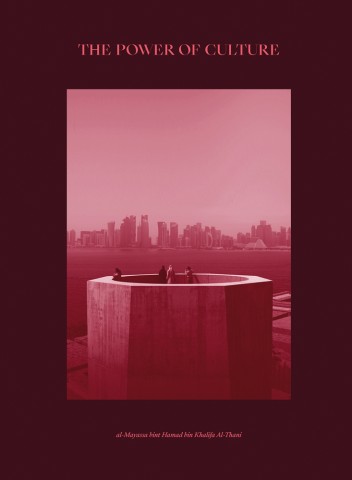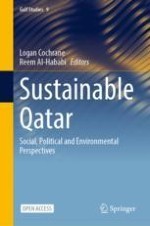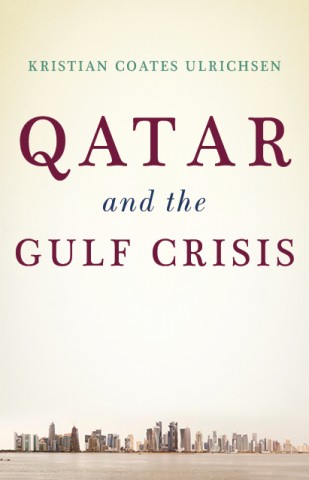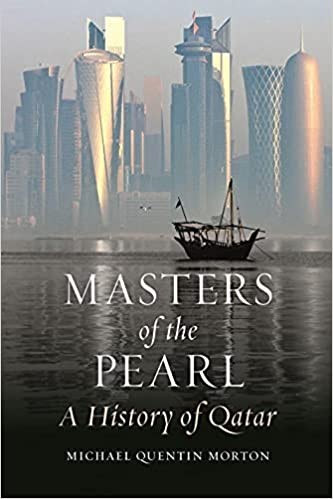For anyone interested to see Qatar, as opposed to read about it (which most of the Reading Qatar list is), a new publication offers such a presentation. Titled "The Power of Culture" (2022), the book is written by al-Mayassa bint Hamad bin Khalifa Al-Thani, who is the Chairperson of Qatar Museums, Doha Film Institute, Reach Out to Asia, Qatar Leadership Center, amongst a wide range of other leadership roles in educational and socio-cultural institutions. Although not an academic book, this book is offers reflections, imagery, and artwork covering a decade of Qatar's journey.
New OPEN ACCESS book
Sustainable Qatar: Social, Political and Environmental PerspectivesIn 2017 the UAE, Saudi Arabia, Egypt and Bahrain launched a land, sea, and air blockade of the State of Qatar. Kristian Coates Ulrichsen (author of more than ten books on the region) documents the blockade in "Qatar and the Gulf Crisis" (2019). The author notes in the text that the writing of the book took place in 2019, and it was published in 2020. Shortly thereafter, on Jan 5th 2021, the blockade (formally) ended with the Al Ula agreement. The book is a thorough documenting of the blockade. For those interested in the crisis (its origins, a detailed documenting of what happened, and the implications thereof after the Al Ula Agreement) this is a useful book. A few quotes:
"The blockade of Qatar in June 2017 originated in the infiltration of the Qatar News Agency in April, and the implantation the following month of a 'fake news' story about comments purportedly made by Emir Sheikh Tamim at a military graduation ceremony 23 May. The hack that set in motion the most severe rupture in the Gulf since Saddam Hussein's invasion of Kuwait in August 1990 took place within the first six months of the Donald J. Trump presidency in the United States." (p. 67).
"Twelve days separated the hacking of the Qatar News Agency, on the night of 23/24 May 2017, and the start of the blockade on 5 June. The intensity of the online and media campaign during that period, both in English and in Arabic, suggests a plan to create an echo chamber that linked Qatar with the issues that subsequently formed the public justification for the blockade. Qatari officials catalogued a total of 1120 critical articles in Saudi, Emirati, and Bahraini media between June and October 2017 alone." (p. 71)
"Qatari policy-makers devised a set of facts- and rights-based responses that contrasted sharply with the sweepingly vague associations leveled against them by officials from the four blockading states. By breaking down the different aspects of the blockade into separate issues, and by seeking arbitration from relevant international bodies, Qatari officials followed a rule-of-law approach which gave weight to institutions of global governance that had been designed to constrain and prevent the reshaping of regional relations through brute force." (p. 6)
"Once the blockade was launched the religious establishment in the blockading states was deployed to legitimize the political action against Qatar. The Grand Mufti of Saudi Arabia, Sheikh Abdul-Aziz bin Abdullah Al ash-Sheikh, issued a fatwa stating that action was being taken against Qatar for the public welfare of all Muslims, while the former Grand Mufti of Egypt, Ali Gomaa, claimed that Qatar's ruling Al Thani family was linked to the Khawarij, a group of dissidents from Sunni Islam whose political and theoretical views were held to be heretical." (p. 95)
"Rather more serious was an extraordinary allegation in November 2017 that a financial institution with suspected links to the UAE had considered engaging in 'financial warfare' intended to bring the Qatari economy to its knees. The outline of the planned assault was said to have been drawn up by Banque Havilland, a Luxembourg-based institution, located in a 'task folder' of an email account that belonged to the Emirati ambassador to the United States, Yousef Al Otaiba, and leaked to journalists working at the Intercept. Under the headline 'Control the yield curve, decide the future,' the document suggested establishing an offshore investment fund to hold Qatari bonds and credit default swaps, and using it to precipitate a run on Qatari debt through 'sham transactions.' This would drive down the price of the bonds and create the impression of panic selling, thereby forcing the Qatar Central Bank to bleed its foreign exchange reserves defending the currency peg." (p. 138)
From the many historical books of Qatar, one of the newest is "Masters of the Pearl: A History of Qatar" (2020) by Michael Quentin Morton. The author has written a history of the UAE, oil in the Middle East, Buraimi, his father's life as an oil geologist, and this book on Qatar (where he spent time as a child). Overall, this is a detailed history that is well structured and well written. The author is not an academic and this book is not published by an academic press (publisher: Reaktion Books), most of my issues with this book are because I am reading this book as an academic with an interest in the sources. However, even as a book for the general audience, as a historical work, it seems consistently referencing sources is good practice.
References: The book does list references and has footnotes, but inconsistently. Many historical details are unreferenced, leaving readers guessing the source of information (trying to look back to the last reference or another nearby footnote). This is missing when evidence is directly referred to, for example: "archeological evidence" (p. 61) and "there is evidence..." (p. 61), which don't have references. Or, there are mysterious sources, such as "one Khalifa historian" (p. 22), "one source" (p. 23), and "from the oral tradition" (p. 24), also without references. This makes an interesting book less useful (for those of us wanting to read the original sources).
Colonial terminology: The author unquestionably uses terminology such as "tribal" and "tribes" as well as "pirates" to describe the people of Qatar (apparently the author disagrees with or has not come across alternative, non-colonial perspectives, such as Sultan Muhammad Al-Qasimi's 1986 book "The Myth of Arab Piracy in the Gulf"). In part, this may be because the author is not a historian by training (a lawyer by profession), where the contextualization and problematization of historical sources would have been a topic of consideration. This relates to the broader framing of the entire book, discussed next.
Colonial lens: The book does not use Arabic sources (or alternatives, such as Turkish or Farsi), and relies heavily on the British colonial record, and thereby privileges the colonial gaze in the telling of history. Western sources are the main reference points (be that maps, names, sources, etc), creating a Eurocentric frame around which history is told. The colonial record is replete with bias (what is included and what is excluded, whose voice is heard and whose is silenced, et cetera). The author does not grapple with this, and largely adopts the colonial gaze as the true and accurate representation of history. This approach is taken even when alternative perspectives do exist, in English, such as Al-Qasimi's book noted above. Amongst the missing books and references is one of the strongest academic books of recent, written by Kamrava in 2013.




